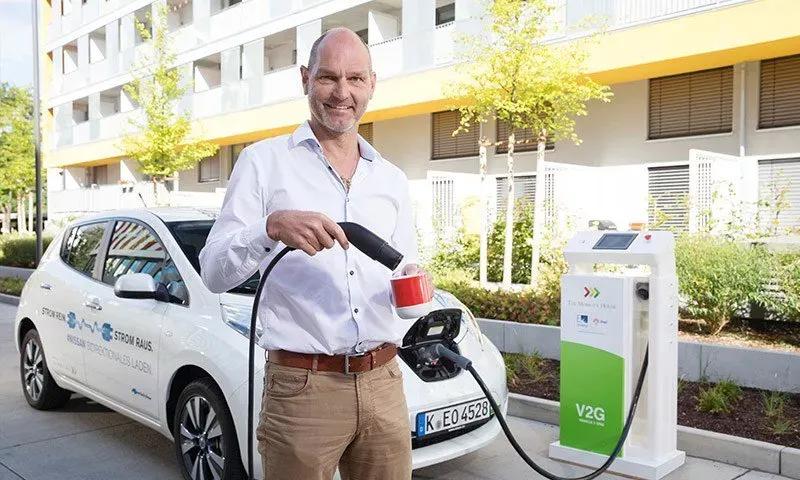Espresso-lovers don’t need to be told twice: to brew a good, strong coffee you need a good quality machine with an operating pressure of at least nine bars, water at a temperature of 93 degrees Celcius, freshly ground beans and a connection to the power grid. Until now! At The Mobility House (TMH) headquarters in the heart of Munich, good espressos are now being prepared using a somewhat different method. Electricity from a car is being used! A Nissan Leaf is parked in the underground car park and supplies the entire office with energy. Electricity from the electric compact car’s battery is fed directly into the office building’s power grid. The revolutionary result: a classic connection to the electricity grid is, at least temporarily, not required.
The electric car’s CHAdeMO rapid-charging connection makes it possible. TMH accesses the car’s battery through a bidirectional rapid charging station from ENDESA and supplies electricity from the car to the office. The idea and its implementation was inspired by the visionary people at TMH.
"Everyone talks about climate change, we do something about it. This project shows that we can speed up the ‘Energiewende’ and that an emissions-free future is within close reach. The car supplies both households and offices with electricity and enables independence from the electricity grid."
Thomas Raffeiner,
CEO, The Mobility House
In the past few years TMH has established itself as an international leader in energy storage and charging solutions. Working together with Nissan, the company is now taking a next step toward the integration of electric cars in the power grid. For the first time, a large number of electric cars shall be integrated in the German power grid as a form of swarm storage. They will serve, amongst other things, to stabilise the grid. Controlled and bidirectional charging are key technologies for this project.
The system from ENDESA was presented to the public by Nissan for the first time at the Geneva Motor Show 2015 and has quickly found further applications in Germany.
"And this isn’t the end of the story. For the first time in the history of the car, this technology makes it possible to use vehicles in a fundamentally new way. Completely new business models emerge, which will help to significantly reduce the costs of electric mobility."
Joachim Köpf ,
Manager e-Mobility, Nissan Center Europe
Nissan considers the German market ready for this technology, not least because of the ’Energiewende’, falling feed-in tariffs and the already high, and ever-increasing proportion of electricity sourced from fluctuating energy sources.
